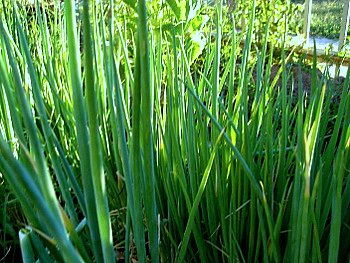|
Seeds for Gardening-Starting SeedsWhen you are choosing seeds for gardening, you will see both hybrid and open pollinated seed varieties for each vegetable. Which is better? Well, it depends on what you want from your garden.
Hybrid SeedsHybrid seeds are a cross between different varieties in an attempt to get the best characteristics of both strains. For example, let's say that you want to get the productivity of one variety of zuchinni, with the disease resistance of another variety. You would hand pollinate the flower of one plant with the pollen from the other. The new seeds will produce plants having the charachteristics of both parents. Any seed these new plants produce, however, will vary widely in growth habits because they won't have the same mix. So although the seeds may grow, you can't know what they will produce. This makes saving seeds from the hybrid plant an unpredictable venture. If saving seeds for next year is not important to you, but getting a good amount of production is, then hybrid seeds may be the best choice for you. In some areas, there are certain plants that will have to be disease resistant. Tomatoes, for example, are susceptible to verticillium wilt, a disease that will cause the plant to wilt and die. Hybrids are mostly resistant. So even if you want to save seeds, in some cases it might be wiser to use a hybrid for that vegetable.
Open Pollinated SeedsOpen pollinated seeds are varieties that have been around for a long time. If they have been grown for more than 50 years, they are considered an heirloom seed. These seeds will produce true to the parent, as long as they are not grown near another variety and accidentally crossed by thewind or bees. You will know what to expect from these seeds. Heirloom seeds continue to be used because people like the way they perform and taste. They will not have as much disease resistance, and may not produce as heavily as a hybrid plant will. The seeds will be reliable from year to year as far as behaving as the parent seed did. Many gardeners are avid about conserving the old heirloom strains. Not only is it important to preserve the genetic diversity, it means you can save those seeds you particularly want from year to year. Organic gardeners are interested in the sustainability of their gardens, and generally use open pollinated and heirloom seed. Another issue that frequently affects this decision is that these plants have not been genetically altered. They will be the same food your ancestors grew and ate. Genetically Altered SeedWhen we talk about genetically altered seed, we are not talking about a simple cross between two varieties of the same family, like two types of squash. This is a simple pollination under controlled conditions. Genetically altered means taking a gene from a completely different species and splicing it into a the genes of a plant. Like using a gene from a fish in a plant. Some companies have also begun developing what is known as terminator seed. That means that the plants will produce a crop from this seed, but no viable seeds. The seeds in the plant you grow will be sterile. This means you have to buy new seed each year. There is much controversy over terminator seed and genetically altered plants. It is up to each person to decide what they want to do in this regard. However, it is beyond the scope of this article to debate the pros and cons of these issues. Choosing the SeedWhen deciding what seeds for gardening that you want to grow, it's a good idea to read the information about the plants in the description. For example, if you live in a climate with hot summers, you might want to choose a variety of lettuce that is slow to bolt. (Bolt means it sends up a stem, blooms, and makes seed.) Once lettuce has bolted it becomes somewhat bitter. The length of your season, between first and last frost date, will determine if you have enough time to grow and ripen some vegetables. So you need to be sure the time to harvest is shorter than your growing season is. Some descriptions will say "prefers long cool spring" or "tolerates humidity well" or other hints as to what climate it will do well in. If you know your temperatures will stay below 90 degrees until July, you might be able to grow something a hot climate that hits 90 degrees in May can't. These hints will be valuable to let you know if you want that variety or one that might perform better in your climate. The amount of space you can allot to a plant when it is full sized will be a major consideration. If your space is limited, you need to choose varieties that will stay in bush form or be medium sized plants. A giant sunflower will not have enough root base to stay upright in a 6 inch bed, for example. It would just fall over on some windy day. Vines can be trained onto a trellis or in a cage, as long as it doesn't grow 20 feet long...you get the idea. Probably the most important factor in your choice is that you choose vegetables that you will actually enjoy eating. You don't want to waste limited space on something you might never eat. So think carefully about what you want from your garden. Personal preferences will determine the types of vegetables. Space and climate will determine what options you have for varieties. Most important of all, have fun with it!
from Seeds for Gardening back to Vegetable Gardening Advice Home |






